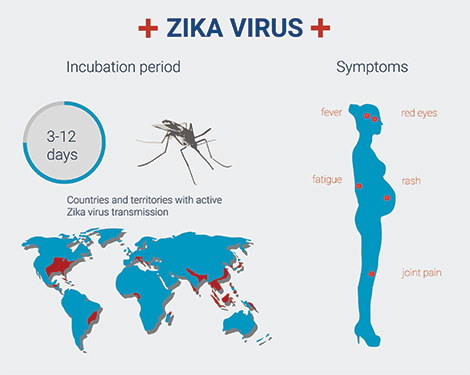Zika Virus, Ebola, Dengue Fever, Chikungunya and Malaria
Recent stories in the media have told of sudden outbreaks of exotic diseases that sometimes make it to the United States. These diseases are almost unknown in industrialized nations, but can spread easily in these times of widespread international travel. Knowledge is power in understanding these diseases and early treatment to prevent the more serious effects. Good mosquito control practices help to limit the number of cases of these diseases in industrialized nations.
Zika Virus
The Zika virus is related to dengue fever, but until recently was thought to have only caused mild symptoms. It was first detected in humans in Uganda decades ago, but there has never been reports of links between the virus and brain malformations until recent months. The news of Zika virus, a disease causing pathogen spread to humans through mosquito bites and spread through sexual contact with an infected person are being found in the U.S. In addition to the illness associated with the virus, there is great concern about the virus’ potential effect in pregnant women as there is mounting evidence of a link to microcephaly, a congenital condition associated with incomplete brain development in infants.
Ebola
Ebola virus outbreaks occur periodically in Africa, but it has also been found in the Philippines and the Peoples Republic of China. It is a serious medical problem that has a fatality rate as high as 90 percent. The Ebola virus is carried by mosquitoes. It occurs mainly in remote areas, but can be transmitted to large population areas if not properly contained. Patients become severely ill with fever, muscle pain, joint pain, sore throat and headache. These symptoms are similar to the flu, so careful assessment of patients who have traveled to areas with Ebola outbreaks must be done. The disease progresses to rash, diarrhea, kidney impairment, liver impairment and both internal and external bleeding. The disease is transmitted through direct contact with blood and body fluids, generally in those caring for patients with the disease. Intensive supportive care is required for patients with this disease.
Dengue Fever
Although this disease is not well known in the United States, cases of dengue fever are beginning to be found here, such as the outbreak of 2009 and 2010 in Key West, Florida. However, most cases are carried into the United States from other countries. Dengue fever is carried by mosquitoes. Infected people may experience mild fever, joint pain and headache, much like the symptoms of the flu. Rash and minor bleeding, such as from the gums, may also occur. However, the disease can progress to diarrhea, vomiting blood, difficulty breathing and bleeding from the nose. There is no specific treatment for dengue fever. Hospitalization to do fluid replacement and pain management is generally necessary. If untreated, the fatality rate can be as high as 50 percent.
Chikungunya
Chikungunya is another mosquito-borne disease that has recently been found in the United States. It is thought to have traveled from the Caribbean, but it also occurs in Africa, Europe, Asia and the Pacific nations. Like the other diseases, it can exhibit symptoms that are much like the flu, with headache, joint swelling, muscle pain and rash. Symptoms can be disabling, but rarely result in death. However, infants and older people are at particular risk for serious outcomes. Treatment includes hospitalization with fluid replacement to prevent dehydration, pain medications and complete rest.
Malaria
Malaria, another mosquito-borne disease, was wiped out in the United States during the 1940s and 1950s. However, medical researchers noted a 40-year high in cases of the illness recently, due to the increased travel to nations where outbreaks are common. In 2011, approximately 2,000 cases were diagnosed in the U.S., almost all acquired in other regions where malaria is prevalent. The disease produces symptoms of constant fever, chills, headache, sweating, nausea, vomiting and fatigue. Early diagnosis and treatment can prevent serious medical outcomes from malaria. A variety of medications are used to treat the disease. Proper treatment can completely eradicate the infection.

